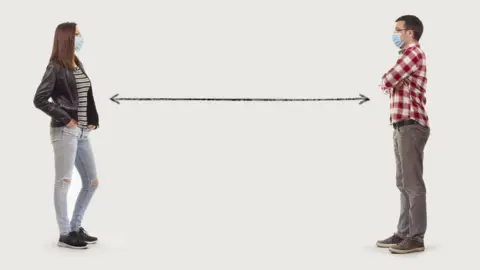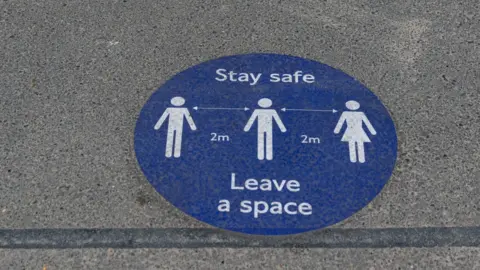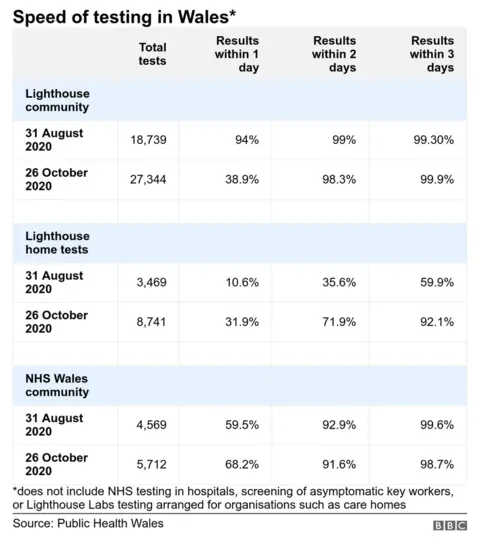Covid: As cases rise, how good is Wales' contact tracing?
 Getty Images
Getty ImagesThe speed at which people who test positive for Covid-19 are reached by contact tracers in Wales has fallen in the face of rising cases, figures show.
In the last week of October, 38% of positive cases were reached within 24 hours, and 66% within 48 hours.
First Minister Mark Drakeford said the test, trace and protect (TTP) system will get more investment and people to deal with an increased workload.
Workers are expected to be employed into the next financial year, he said.
The TTP system contacts people who have tested positive to give them advice on self-isolation, and to find out who their "close contacts" have been.
A member of Independent Sage - a group of scientists formed to release independent advice on the pandemic - told BBC Wales that any delay in the system is problematic because "there are contacts that don't know they are contacts unknowingly spreading the disease", but it was difficult to "keep up" when numbers are accelerating.
Additionally, while high percentages of cases and close contacts have been successfully contacted, thousands of people have not been reached at all.
How is contract tracing performing in Wales?
 Getty Images
Getty ImagesThe numbers of positive cases and close contacts the system has been dealing with has risen in the last few weeks, and the statistics point to the scale of the challenge facing the contact tracing system.


The UK government's Scientific Advisory Group for Emergencies (Sage) committee suggested in May contact tracers needed to reach at least 80% of cases and their close contacts, but speed is also important.
In the week ending 31 October, 85% of positive cases, and 82% of close contacts in Wales were reached by contact tracers.
However in the face of fast-rising numbers of cases, the ability of the Welsh system to reach cases and contacts has declined.
The number of positive cases not reached at all was 1,283, and the number of identified close contacts not reached was 3,295.


Prof Gabriel Scally, a member of Independent Sage, a visiting professor in public health at the University of Bristol and president of epidemiology and public health at the Royal Society of Medicine, said there was no "internationally agreed set of standards" for contact tracing.
However, in his view: "The ideal would be that every step was within 24 hours - a test within 24 hours of getting symptoms, test result within 24 hours, speak to 80% of positive cases within 24 hours, and speak with 80% of close contacts within another 24 hours."
He added: "It is also significant that a large number were not contacted. The systems are not keeping up.
"[Contact tracing] works well when the numbers are moderate, but if the numbers are high and accelerating it's really difficult to keep up.
"The really successful places have used social restrictions to get numbers down so that contact tracing can operate.
"A contact tracing system by itself won't keep it at bay without restrictions."
'Significant operation'
 Getty Images
Getty ImagesPaul Mee, contact tracing lead for the Cwm Taf Morgannwg health board area and director of public health, protection and community services at Rhondda Cynon Taf council, said "test, trace and protect" was a "significant operation".
"Our contact tracers are working incredibly hard across the region, dealing with around 400 new cases of confirmed infection daily, and having to trace each of those people's contacts and advise them to self-isolate," he said.
"In terms of scale, we are looking at making contact with over 1,000 people daily.
"Data from the TTP service has highlighted to us that the main source of infection is happening in close, indoor social settings, such as friends and family visiting each other in their homes or contacts in the workplace or at hospitality venues."
'As quickly as possible'
The first minister was asked on Monday if the contact tracing system was struggling to keep up with an increase in cases.
He said: "We've used the 17 days (of the firebreak lockdown) to enhance our plans to recruit more people in to the system and we've been switching some people in the system as well.
"Not only is it right to contact the volume of people, and that number has been going up very rapidly, but you've got to do it as quickly as possible."
The Welsh Government has told BBC Wales it had recruited 1,300 contact tracers by the end of September, and during October was recruiting a further 500, with plans to train them.
How fast is testing in Wales?

On top of increasing numbers of cases, contact tracers can only get to work once a positive case has been identified and referred to them.
The Welsh Government states it is "reliant on tests being taken quickly".
Wales uses the UK government's private sector Lighthouse Labs, and some NHS Wales testing.
The speed of Lighthouse Labs processing community tests has fallen since August but the number of tests it has carried out has increased from 18,739 to 27,344.
The speed of home tests has improved from a low start, but now just over 30% are processed in a day and just over 70% in two days.
NHS Wales labs have been faster - but they process much fewer tests in the community.
This does not include testing arranged through the Lighthouse organisation portal for care homes and others, or NHS Wales hospital testing or screening of asymptomatic health workers.
